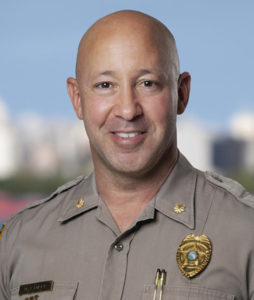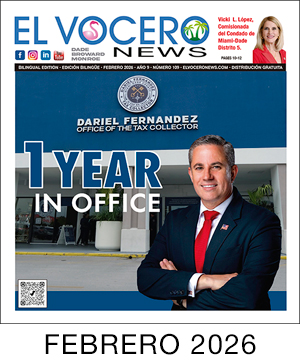By Jesús Hernández
Mario Knapp, a 27-year veteran of the Miami-Dade Police Department (MDPD), is running to be elected first sheriff in 58 years.
Democrats and Republicans registered voters are encouraged to vote for the primary election on Aug. 20, which will be followed by the general election on Nov. 5.
-Safety is the main concern. What do you plan to do to make the community even safer?
We must increase the number of police officers on the streets. From the criminal’s perspective, crime is based on the opportunity to commit the crime and the risk associated with committing the crime. So, the only way to minimize the opportunity to commit a crime is by having more uniform visibility and patrolling on the streets.
 -According to Miami-Dade County, the crime rate is stable, but higher than the national average. How do you plan to change that?
-According to Miami-Dade County, the crime rate is stable, but higher than the national average. How do you plan to change that?
Crimes are not being reported accurately because it doesn’t benefit some commanders to report the crimes committed in their areas accurately. We need to report crime in a manner that’s more honest and way more accurate. Then, we need to look at every crime and address it in a data-driven capacity. If we don’t understand the data and we’re not reporting it accurately, then we’re not going to be able to solve the problem.
-We have over 30 different local police departments in Miami-Dade County. What’s your plan as far as working with all of them?
We already have mutual aid agreements with all these agencies and we’re going to continue to support that. The sheriff’s office should not reduce services to any of these local communities. I plan to have at least monthly meetings with every municipality so that we can collaborate and solve our collective problems because crime is not specific to an area, a city, or a district. South Florida crime affects every city.
-The criminal justice system is complex, and sometimes officers complain about criminals going home too soon.
It’s important to know who you are voting for those positions. There are candidates who are flip-flopping between cash bail and no cash bail methodology, and I think that’s important for people to identify. I believe that we’re going to work collaboratively also with our state attorney’s office. The sheriff’s office is going to be the law enforcement representative of the people and not of local government and local politicians. We’re going to have a little bit more influence and a little more latitude to stand in front of the media cameras and explain to the public exactly how people are being charged and exactly how they’re being adjudicated.
-Some residents complain about police officers’ stopping on the road and obstructing the traffic, instead of pulling to the side, when we already have a traffic situation in the County. What can you do about that?
Number one, it’s about training and messaging to our troops. Sergeants need to be held accountable for what their officers do. We’re going to be a principal-based department. And we’re going to continue to hold officers accountable when they do something wrong. And we also are going to defend our police officers unapologetically when they’re doing the right thing.
Mario Knapp: “Necesitamos aumentar el número de policías en las calles”
Por Jesús Hernández
Mario Knapp, un veterano de 27 años en el Departamento de Policía de Miami-Dade (MDPD), se postula para ser elegido primer sheriff en 58 años.
El 20 de agosto los votantes registrados demócratas y republicanos votarán sus respectivos favoritos, a las que seguirán la elección final el 5 de noviembre.
-La seguridad es la principal preocupación. ¿Qué planea hacer para que la comunidad sea aún más segura?
Debemos aumentar el número de policías en las calles. Desde la perspectiva del delincuente, el delito se basa en la oportunidad de cometerlo y el riesgo asociado con su realización. La única manera de minimizar la oportunidad de cometer un delito es tener una presencia policial mayor.
-Según el Condado de Miami-Dade, la tasa de criminalidad es estable, pero superior al promedio nacional. ¿Cómo planea cambiar eso?
Las cifras no se informan con precisión porque no beneficia a algunos de los jefes informar con precisión los crímenes cometidos en sus áreas. Necesitamos reportar los delitos de una manera más honesta y precisa. Luego, debemos analizar cada delito y abordarlo basándonos en datos. Si no entendemos los datos y no los informamos con precisión, entonces no podremos resolver el problema.
-Tenemos más de 30 departamentos de policía locales en el condado de Miami-Dade. ¿Cuál es su plan en cuanto a trabajar con todos ellos?
Ya tenemos acuerdos de ayuda mutua con todos esos equipos locales y vamos a seguir apoyándolos. La oficina del sheriff no debería reducir los servicios a ninguna de estas comunidades locales. Planeo tener reuniones al menos mensuales con cada municipio para que podamos colaborar y resolver nuestros problemas colectivos porque el crimen no es específico de un área, una ciudad o un distrito. La delincuencia en el sur de Florida afecta a todas las ciudades.
-El sistema de justicia penal es complejo y hay agentes que se quejan de que los delincuentes salen de la cárcel demasiado pronto.
Es importante saber a quién se vota para esos puestos. Hay candidatos que oscilan entre la metodología de fianza en efectivo y la de no fianza en efectivo, y creo que es importante que la gente lo sepa. Creo que también vamos a trabajar en colaboración con la oficina del fiscal de nuestro estado. La oficina del sheriff será el representante del pueblo en materia de aplicación de la ley y no del gobierno y los políticos locales. Vamos a tener un poco más de influencia y un poco más de libertad para pararnos frente a la prensa y explicar al público exactamente cómo se acusa a las personas y exactamente cómo se les juzga.
-Hay personas que se quejan de agentes de la policía que se detienen en medio de la calle y obstruyen el tráfico, en lugar de hacerse a un lado, cuando ya tenemos una seria situación de tráfico en el condado. ¿Qué se puede hacer al respecto?
Número uno, se trata de entrenar e informar a nuestras tropas. Los sargentos deben rendir cuentas por lo que hacen sus oficiales. Vamos a ser un departamento basado en responsabilidades. Y vamos a seguir responsabilizando a los agentes cuando hagan algo mal. Y también vamos a defender sin disculpas a nuestros agentes de policía cuando estén haciendo lo correcto.













